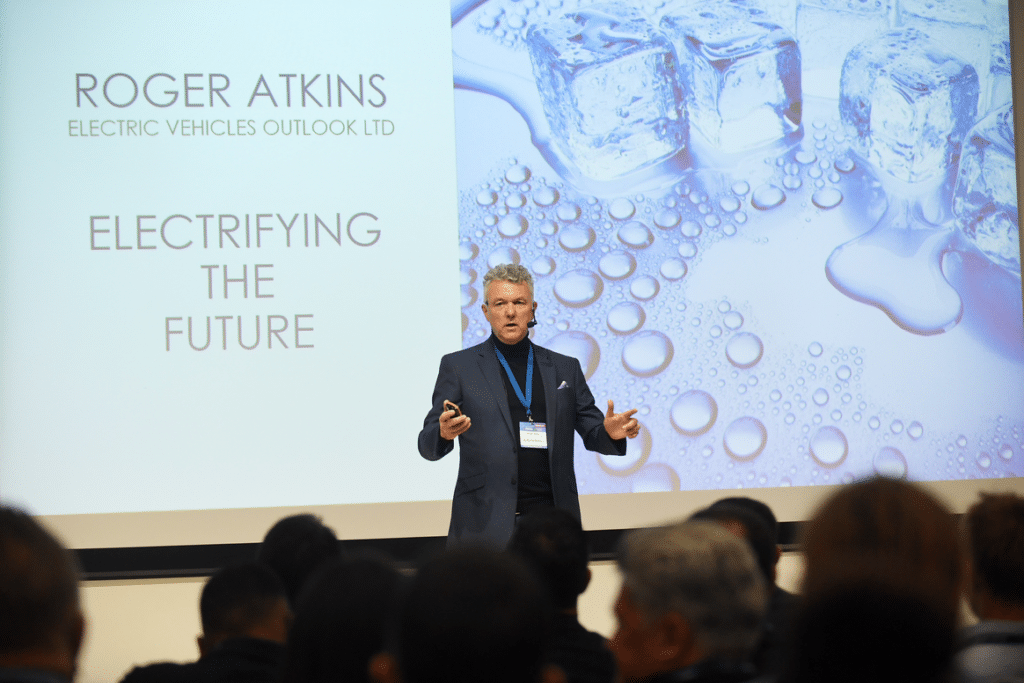EV Influencer Roger Atkins Gives EV Industry Advice to UK’s Labour Party
Fantastic news for electric vehicle (EV) advocates came from the UK In July 2024, as official election results showed a landslide victory for the country’s Labour Party.
In 2020, the UK said it would ban new gasoline and diesel cars by 2030. Last year, the Conservative party pushed the 2030 goal to 2035, along with watering down some of the government’s green energy policies.
The Labour Party is much more favorable to environmentalism and electric vehicles than the Conservative party. The Labour party said: “We believe that the 2030 deadline is the right policy which industry was confident of hitting. Pushing back the date of the phase out will raise costs for British families by billions of pounds because electric vehicles have cheaper lifetime costs than petrol cars, and by 2030 are expected to have lower upfront costs. We will oppose the Government’s plans to water it down.”
Roger Atkins, a London, UK-based EV Influencer, Gave His Opinion of How Labour Should Handle the EV Transition
EVinfo.net is very honored to report the following opinion from Roger Atkins. Atkins is a very highly respected and well-known London UK-based electric vehicle industry influencer.

Roger Atkins said: “As China has clearly demonstrated, taking a conservative approach to the shift to electric vehicles isn’t how you make things happen. Fortunately for the UK, as of last Friday’s general election, we will no longer be taking a conservative approach as the country now has a Labour Government. They have policies waiting in the wings such as Jonathan Reynolds ‘Driving A Growing Economy – Labour’s Plan for The Automotive Sector’ – published prior to the new Secretary Of State for Business & Trade taking office, it makes the essential connection between renewable energy and EV’s and sets a stall out to grapple with the job of making up for lost time.
His new government will part-finance the new, additional gigafactories required to hit the 200GWh of supply of manufactured batteries as defined by the UK’s Faraday Institution, as well as creating a new category of Nationally Significant Infrastructure Projects for growth industries – including gigafactories. To start tackling the skills gap that’s expected to materialize by 2027, creating a shortfall of 25,100 EV-trained TechSafe technicians by 2030, Labour will replace the Apprenticeship Levy with a Growth and Skills Levy allowing businesses the flexibility they need to access a wider range of training courses. Labour will commit to ten-year automotive R&D funding decisions – matching that given to aerospace (Every £1 invested by government in ATI projects has resulted in £7 of private sector R&D investment)
Some have suggested that the ZEV Mandate that came into effect January 2024 here in the UK , one of the most ambitious regulatory frameworks in the world for the switch to electric vehicles – was well intentioned but a bit like shoving a square peg into a round hole without a cohesive Industrial Strategy …which hopefully, Labour’s fresh approach fully resembles.
And now for the tricky part. Both the USA and Europe have recently instigated a tough tariff regime on Chinese car imports – but the UK has not yet shown its hand. In that regard, as you might recall, David Cameron (one of the 5 Tory Prime Ministers we saw over 14 years) called a referendum on the country’s membership of the EU in 2016, and then Boris Johnson subsequently ‘Got Brexit Done’ – whatever that was supposed to mean as we still have many loose ends 8 years on!
What it does mean however is that the UK is now free to either watch and wait until the dust settles on the EU plan (underway from July 1st but still to be fully ratified) or go it alone and embrace Chinese EV enterprise with a more diplomatic, consultative, pragmatic approach…put more simply – lower tariffs than anywhere else!
However, one thing’s for certain amidst all the what if’s…the country is ready, willing, and able to play an active part in building both the new energy and electric vehicle economies. We have the R&D capability, the passion, and at long last – a plan and the political will to bring it all together!”
Electric Vehicles Outlook Ltd
Atkins is the Founder of Electric Vehicles Outlook Ltd, a business consultancy that helps clients navigate the EV industry in the electric-connected-autonomous-shared vehicles space. With almost 40 years of experience in the auto sector, Atkins has a deep and diverse knowledge of the industry, its trends, challenges, and opportunities. As an EV advocate and connector, Atkins shares insights and stories through his popular blog, podcast, and LinkedIn platform, where he has more than 300,000 followers and has been recognized as a Top Voice for EV. He also provides strategic advisory services to various companies, organizations, and initiatives that are driving innovation and impact in the EV ecosystem. Follow Electric Vehicles Outlook Ltd, on LinkedIn.
Labour’s Plan for the Automotive Sector

The Labour party posted its plan for the Automotive Sector, outlining a strong commitment to the EV industry:
Driving a Growing Economy: Labour’s Plan for the Automotive Sector
Labour’s Plan said:
“As the world pivots to generating electric vehicles, the UK automotive industry should be poised to jump at that opportunity.
The global shift towards zero emission vehicles presents a unique opportunity for the UK automotive sector to reinvigorate itself and regain its competitive edge – but time is running out. Labour believes that by embracing the opportunities of the ZEV revolution, the UK can leverage its technological prowess, skilled workforce, and industrial heritage to tap into new markets, create jobs, and drive sustainable growth.
Labour’s mission is to ensure electric cars, powered by cheap home-grown energy, don’t become the preserve of the wealthy. We believe everyone should feel the benefit of the transition to electric vehicles and cheaper running costs.
A Labour government would drive the automotive industry into the future by accelerating domestic battery making capacity, investing in gigafactories, and removing planning barriers to get shovels in the ground.
We will inspire consumer confidence and demand by fixing charging infrastructure and developing clear battery standards consumers can understand.
Labour’s plans will improve the competitiveness of the UK automotive sector which now faces the highest industrial energy costs in Europe. Our plans to provide clean energy by 2030 will see the industry benefit from cheap, reliable energy, and improved grid capacity.
Battery factories on our shores, reliable charging networks in every part of the country, secure supply chains, increased consumer demand and 80,000 more high skilled jobs. The Faraday Institution estimates that the UK will need 200GWh of supply of manufactured batteries to maintain our domestic electric vehicle production.
Through our National Wealth Fund, Labour will part-finance the new, additional gigafactories required to hit that target.”

Electric Vehicle Marketing Consultant, Writer and Editor. Publisher EVinfo.net.
Services